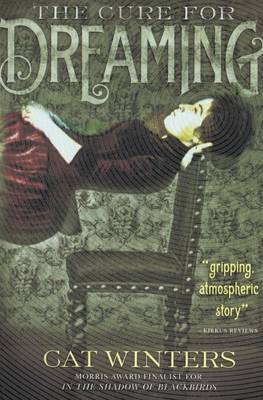
celinenyx
Written on Jul 19, 2014
Set during the highdays of the Suffragist movement, The Cure for Dreaming tells to story of one girl trying to find her place in the world. Women are in an awkward position; they want agency and freedom, but there are many protesting voices that find that women belong inside of the home. Trying to cure Olivia from her "useless dreams" (namely going to college and having a carreer), Olivia's father hires a hypnotist, the young Henri Reverie.
Writing about feminist movements is tricky business. It's easy to alienate your reader if your story becomes too preachy or obvious. We all know that women have souls (something that sparked debate during the 19th century) and that they are equal to men. At least, we all should know this. Ms Winters did a great job at not making men in general seem like bad guys, a common problem in female rights centered books. The truth is that many men are feminist, and that many women aren't. The Cure for Dreaming displays this pretty well.
However, I don't think it was all perfect. At one point Olivia can see how the world really is. This means that she can see some kind of life energies. Some people are very dim (and unhappy) while others shine brightly (happy people). Women with their husbands are either described as normal looking or dim or even invisible. Suffragists, just girls hanging out, are all considered super bright. I would think this is an overstatement; just because you're free doesn't mean you're happy, and just because you have a husband doesn't make you oppressed. It's a minor detail that didn't stop me from enjoying the story, but it did make me think about how reality is much more complicated than that.
The Cure for Dreaming is a historical novel with a paranormal tinge, depending on whether you believe hypnosis is really possible beyond a certain extend. The fact that Olivia sees the true nature of people, they often appear to her like vampires or other terrible monsters. This gives the book a flair of horror and a nightmareske aspect, although it never descends into something truly scary.
The major conflict in the book is the one between Olivia and her father. Her father thinks he is doing the right thing by caging Olivia, making her into a submissive housewife so she can marry a good match. However, his motives are also selfish, because he wants Olivia to stay close and not turn into her mother. This ambivalence was well done, and her father was a very interesting character for me.
There is a small romantic plotline in the book, which isn't the focus of the story. It was a very nice one though, very realistic and dependant on small moments, instead of the epic love storiea Hollywood seems to favor. I was especially thrilled over how the romance was resolved. It was done perfectly in the spirit of the book and fitted wonderfully.
The Cure for Dreaming is a really good and interesting book, and Winters' talent for worldbuilding shines yet again. It's a slightly less moody and creepy sister to In the Shadow of Blackbirds, but with just as strong a story.
